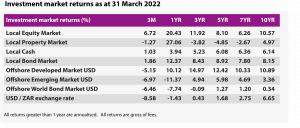Market Overview
- The global developed equity market, sold off some -5.2% in USD over the quarter while emerging markets retracted nearly -7% over the same period.
- The negative returns from these equity markets can be in part attributed to the more hawkish stance of central banks and their concerns of deepening inflation, Russia’s invasion of Ukraine, widespread sanction against Russia, the energy crisis in Europe, and overall sluggish global economic growth.
- Brent crude oil came under significant pressure over the quarter, rising well over $130/barrel before retreating to close the quarter at $108/barrel.
- The local equity market (+6.7%) outperformed both developed and emerging markets in both base currency and rand terms over the quarter.
- This performance was primarily driven by the strong rally in Financials (+20.2%) and Resources (+18.2%). Local banks reported relatively robust balance sheets and stronger than expected earnings.
- Industrials was the largest detractor (-13.1%) from local equity market performance over the quarter as investors tried to digest the impact of Russia-Ukraine war, widespread lockdown in China and overall Chinese regulations.
- JSE shares with predominantly local earnings outperformed shares with predominantly foreign earnings (rand hedge shares) as the rand strengthened 8.6% over the quarter.
- The local property market pulled back slightly (-1.3%) over the quarter. The outlook for local property remains volatile amid the uncertain shift in overall demand for property and impact from the Russia-Ukraine war on the European property sector.
- Global inflation signals persisted as elevated levels of consumer spending continue to collide with supply shortages across the world. It is likely that inflation will abate to some extent in the latter part of 2022, as we expect supply-side disruptions to be resolved.
- Nagging inflation concerns have pushed bond yields up and re-ignited concerns that central banks may raise interest rates and moderate monetary stimulus more rapidly than previously forecasted.
- During the 2022 National Budget, Finance minter Enoch Godongwana, confirmed that collections exceeded expectations amid the windfall in SA’s mining sector revenue. Furthermore, he believes that SA is on track to achieve the fiscal goals set out in the 2021 medium term budget policy statement.
- The South African Reserve Bank (SARB) hiked SA Interest rates by 0.25% in March as widely expected. February inflation (CPI) in South Africa flirted with the top end of SARB’s target range (3% – 6%) coming in at 5.8%.
- The local bond market (ALBI) delivered +1.9% for the quarter ahead of local cash (STEFI) +1.0%, as increased bond yields pulled longer duration bond prices down. In this low interest rate environment, SA money market has fallen below its long run return expectation.






